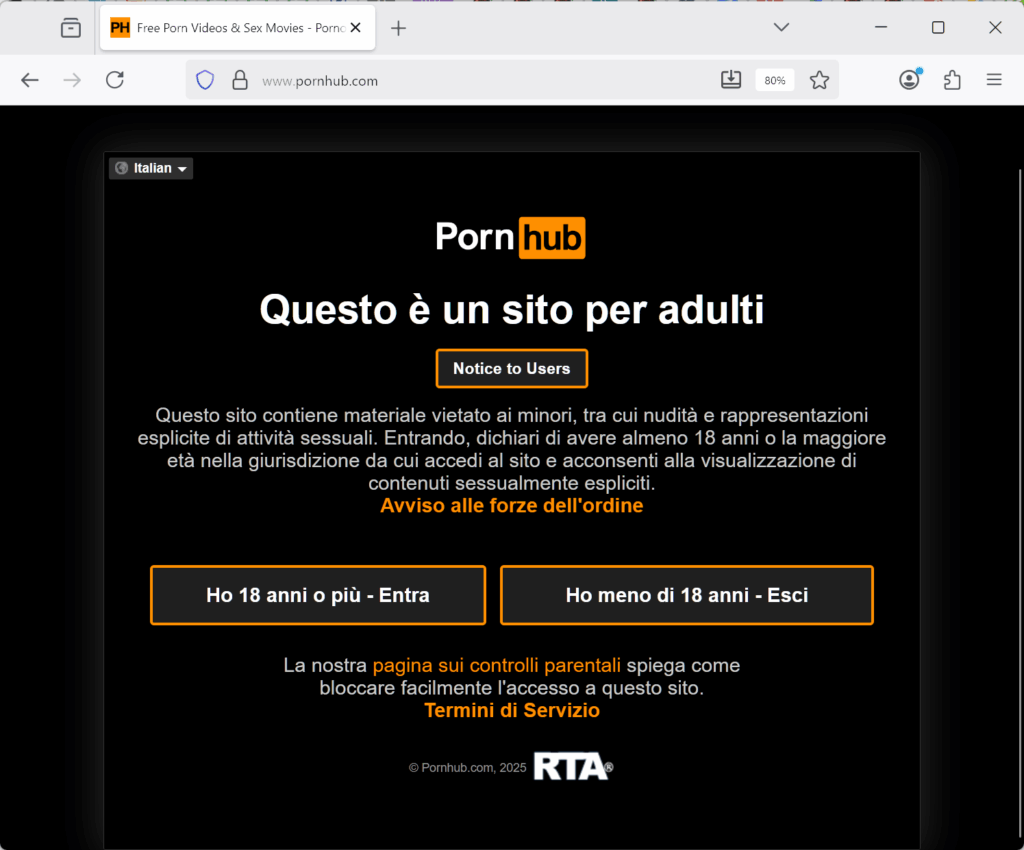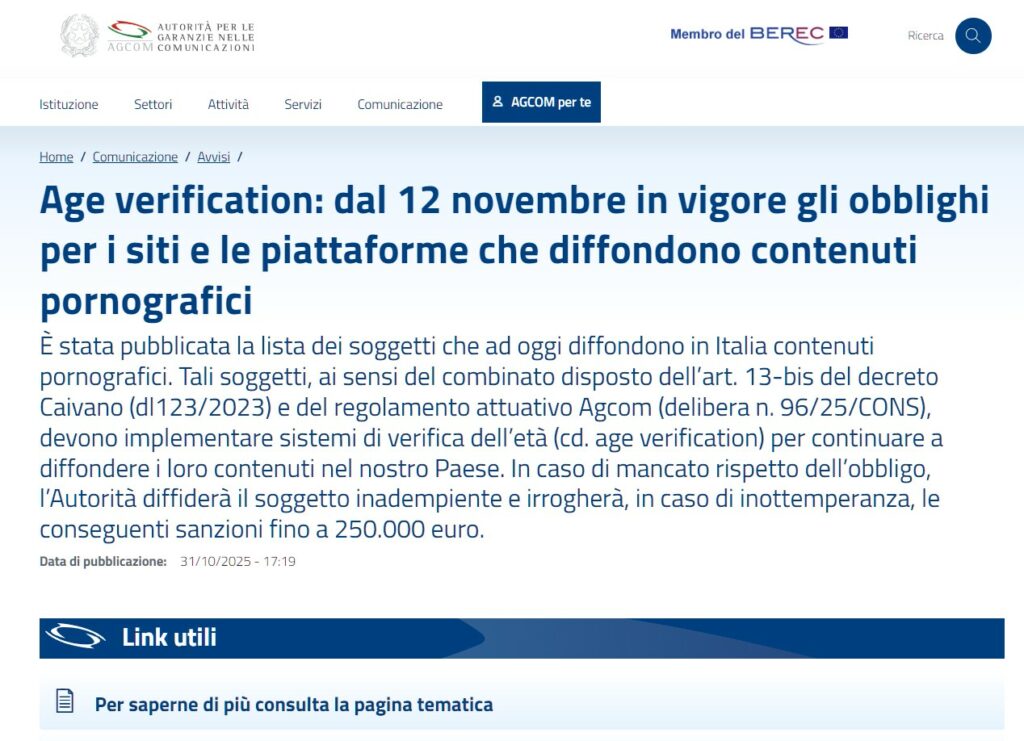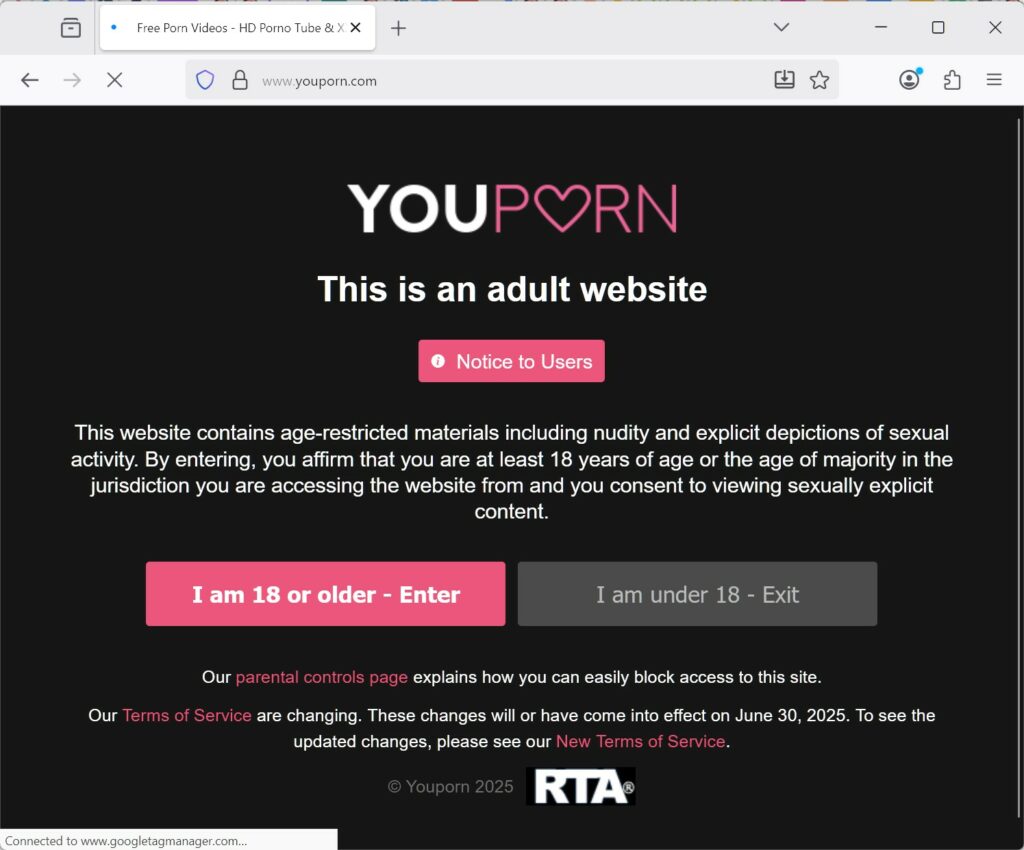
Dal 12 novembre 2025, l’AGCOM ha riportato che in linea con l’art. 13-bis del decreto Caivano (dl123/2023), 47 siti per adulti raggiungibili dall’Italia avrebbero dovuto introdurre un sistema di verifica dell’identità per impedire l’accesso ai minori.
Una misura attesa da mesi, annunciata come un passo deciso verso la tutela dei più giovani online. Tuttavia, a distanza di un giorno dalla scadenza fissata, i principali portali per adulti sono ancora liberamente accessibili, senza alcun tipo di verifica aggiuntiva.

Visitando oggi il più grande hub mondiale di contenuti per adulti, Pornhub, il sito si presenta esattamente come prima: una schermata iniziale in cui l’utente deve semplicemente dichiarare di avere almeno 18 anni per entrare. Una finestra standard, identica a quella visibile in altri Paesi dove, tuttavia, esistono veri controlli di accesso. Basta cliccare “Ho 18 anni o più – Entra” per poter accedere liberamente a tutti i contenuti.
Questa situazione solleva più di una domanda. L’Italia aveva promesso un intervento deciso, dopo mesi di discussioni e pressioni da parte di associazioni e politici. Ma oggi la realtà è che nulla è cambiato: i siti restano aperti e la verifica dell’identità rimane solo sulla carta. Una vicenda che richiama alla mente altri casi in cui annunci e provvedimenti si sono rivelati inefficaci o incompleti.

Premesso che noi di Red Hot Cyber riteniamo che il provvedimento, anche se attuato, sarebbe stato comunque un rimedio di facciata, è evidente che il problema non è solo tecnico ma anche politico e culturale. L’uso di strumenti come VPN, Tor Browser o proxy consente di aggirare facilmente qualsiasi blocco o restrizione geografica, rendendo la misura una barriera solo apparente. Inoltre, in un contesto così destrutturato, a gonfiarsi il portafogli sarebbero i criminali informatici che spaccerebbero VPN infostealer con VPN Gratuite e incetta di dati personali.
Ma c’è un aspetto ancora più preoccupante: l’immagine che l’Italia trasmette alla comunità internazionale. Quando un Paese annuncia una misura di controllo e poi non la applica, ne esce indebolito. E questo non riguarda soltanto la gestione dei contenuti per adulti, ma più in generale la credibilità nel far rispettare le proprie leggi digitali.

Un precedente simile si era già verificato con il caso DeepSeek, l’intelligenza artificiale cinese che era stata “vietata” in Italia ma di fatto mai realmente bloccata. Una storia che si ripete, dimostrando come spesso gli annunci non si traducano in risultati concreti.
Ci si chiede allora cosa pensino oggi i gestori dei 47 siti per adulti che erano stati messi sotto osservazione: forse si domandano quanto seriamente l’Italia voglia davvero affrontare il tema. Una domanda che, purtroppo, ci facciamo anche noi.
Perché due mesi di tempo, forniti ai siti che operano al di fuori dell’Italia per adeguare le proprie infrastrutture, è una infinità di tempo rispetto ad un problema così sentito.
Al momento, non si parla di sanzioni né di provvedimenti concreti contro i siti che non hanno rispettato l’obbligo di introdurre un sistema di verifica dell’età. Nessuna multa, nessuna azione da parte delle autorità competenti sembra essere stata avviata.
Un silenzio che stride con quanto avvenuto, ad esempio, in Francia, dove dopo il lancio ufficiale del sistema di Age Verification, solo pochi portali erano rimasti operativi senza adeguarsi alle nuove regole, e furono rapidamente bloccati o costretti a conformarsi. In Italia, invece, l’impressione è che tutto sia rimasto fermo al livello delle dichiarazioni di principio, senza alcun seguito concreto.
E così, mentre la tecnologia e la rete corrono a una velocità sempre maggiore, l’Italia sembra rimanere ferma nel limbo delle buone intenzioni e delle grandi promesse.
Ci viene in mente una frase molto lontana, ma ancora attuale del grande Adriano Olivetti, che descrive perfettamente la situazione di oggi:
“L’Italia procede ancora nel compromesso, nei vecchi sistemi del trasformismo politico, del potere burocratico, delle grandi promesse, dei grandi piani e delle modeste realizzazioni.”
Ti è piaciuto questo articolo? Ne stiamo discutendo nella nostra Community su LinkedIn, Facebook e Instagram. Seguici anche su Google News, per ricevere aggiornamenti quotidiani sulla sicurezza informatica o Scrivici se desideri segnalarci notizie, approfondimenti o contributi da pubblicare.

 Cybercrime
CybercrimeLe autorità tedesche hanno recentemente lanciato un avviso riguardante una sofisticata campagna di phishing che prende di mira gli utenti di Signal in Germania e nel resto d’Europa. L’attacco si concentra su profili specifici, tra…
 Innovazione
InnovazioneL’evoluzione dell’Intelligenza Artificiale ha superato una nuova, inquietante frontiera. Se fino a ieri parlavamo di algoritmi confinati dietro uno schermo, oggi ci troviamo di fronte al concetto di “Meatspace Layer”: un’infrastruttura dove le macchine non…
 Cybercrime
CybercrimeNegli ultimi anni, la sicurezza delle reti ha affrontato minacce sempre più sofisticate, capaci di aggirare le difese tradizionali e di penetrare negli strati più profondi delle infrastrutture. Un’analisi recente ha portato alla luce uno…
 Vulnerabilità
VulnerabilitàNegli ultimi tempi, la piattaforma di automazione n8n sta affrontando una serie crescente di bug di sicurezza. n8n è una piattaforma di automazione che trasforma task complessi in operazioni semplici e veloci. Con pochi click…
 Innovazione
InnovazioneArticolo scritto con la collaborazione di Giovanni Pollola. Per anni, “IA a bordo dei satelliti” serviva soprattutto a “ripulire” i dati: meno rumore nelle immagini e nei dati acquisiti attraverso i vari payload multisensoriali, meno…